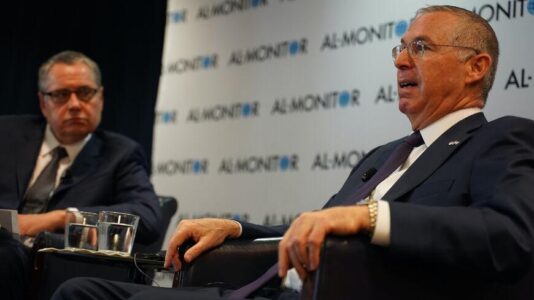
Delisting the IRGC as terror group would send terribly wrong message
Israel is concerned it will bear the consequences of a restored nuclear agreement with Iran that fails to build on the original tattered deal, Israeli Ambassador to the United States Michael Herzog said Thursday.
Herzog spoke during a breakfast briefing hosted by Al-Monitor at the National Press Club in Washington, where the Israeli envoy discussed his government’s views on the stalled nuclear talks, prospects for Israeli-Palestinian peace, Israel’s response to the war in Ukraine and its deepening ties with Arab states.
Talks to salvage the Joint Comprehensive Plan of Action (JCPOA) are held up over Tehran’s demand that Washington drop the Islamic Revolutionary Guard Corps (IRGC), a powerful branch of Iran’s military, from its list of Foreign Terrorist Organizations (FTO). US Special Envoy for Iran Robert Malley has indicated the IRGC would remain subject to broad American sanctions even if it were taken off the terror blacklist, making the FTO designation largely symbolic.
“Since the IRGC is on the terror list, delisting it now as part of a nuclear deal sends a terribly wrong message to our part of the world,” Herzog, who previously served as a general in the Israel Defense Forces, said. “I think it’s no coincidence that [Iran] insists and they define it as a red line that they want to delist the IRGC.”
Herzog said Israel would support an accord that’s “longer and stronger,” referencing a term previously used by the Biden administration to describe plans for a more encompassing agreement that would address Iran’s ballistic missile program, support for terrorist proxies and other non-nuclear issues. But “we no longer hear any talk of ‘longer and stronger,’” Herzog said.
“We would support a diplomatic outcome that rolls back Iran’s nuclear capabilities significantly and for a long time,” said Herzog. “Our concern is that the deal negotiated doesn’t meet these criteria.”
“[Iran] should face either a diplomatic outcome that we can live with or deterrence so that they don’t push the envelope,” he said, elaborating on a point he made in a 2014 article for Al-Monitor.
On differences with the Biden administration over Iran, “I cannot complain that we are not being heard,” Herzog said. “We know exactly where we differ, but it’s an ongoing dialogue.”
Source: Al Monitor





